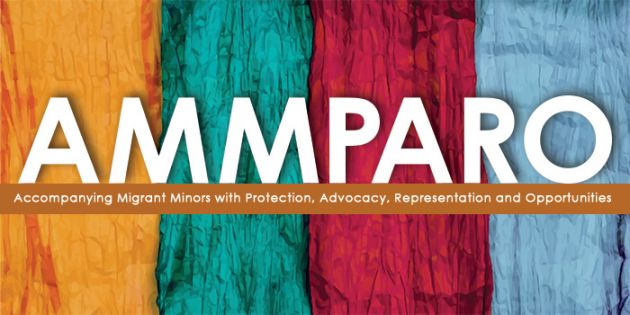Faith communities noted as both 'first and last responders' for children on the move by key UNICEF adviser

Because faith communities that work closely with the UN children's agency are deeply involved with young people on the move, they can play a crucial role in applying the global compacts on safe migration and refugees, an adviser to UNICEF says.
As both the "first and last responders" to children on the move, faith communities are vital partners of UNICEF (the United Nations Children's Fund) which with the World Council of Churches (WCC) and the Faith Action for Children on the Move global initiative organized a worldwide webinar on 30 April.
It was titled: "What the Global Compact for Safe, Orderly and Regular Migration and the Global Compact on Refugees mean for children and what faith communities can do for their implementation."
The two compacts are inter-governmentally negotiated agreements, prepared under the auspices of the United Nations in December 2018.
Caterina Tino, a UNICEF communication specialist and Peter Prove, the WCC's director of International Affairs gave introductions. Tino observed that in cross-border situations involving children, faith organizations can play a key role.
Verena Knaus, a senior UNICEF adviser spoke on the meaning of the two global compacts and noted that faith-based groups are both "first and last responders" for children on the move.
"Migration politics are not getting any easier. On the contrary, they are getting tougher and getting more and more politicized. The language is getting sharper and even more discriminatory," said Knaus.
At the same time, there are many instances of governments "staying the course" in maintaining what is seen as "basic decency" and allowing for dignity and solidarity with people on the move.
She said that globally each day 14,000 children get displaced.
33 MILLION FORCIBLY DISPLACED CHILDREN
The caseload of forcibly displaced children worldwide is 33 million and 12 million children are refugees or asylum seekers.
Prove said that sharing in the light of the two global compacts is an important priority for the WCC and a "leading instrument of our partnership with UNICEF".
He noted that the WCC's commitment to children includes the promotion of child protection, "promoting meaningful participation by children and adolescents" and raising church voices for intergenerational climate justice for and with children. He said the WCC also engages in this work on an interfaith basis.
David Boan, director of humanitarian advocacy and service for the World Evangelical Alliance, spoke for the Faith Action for Children on the Move global initiative on ending all violence against children and fighting xenophobia.
He said spirituality can have a key input to the psychological health of children.
Olivia Wilkinson, director of Research for the Joint Learning Initiative on Faith and Local Communities, gave an overview of current responses, program approaches, best practices, policy frameworks and advocacy efforts by faith communities in support of children on the move.
RELIGIOUS COMMUNITIES' ROLE IN CHILDREN'S WELLBEING
She said, "Religious communities -- their leaders, institutions and faith-based organizations -- play a critical role in promoting and enhancing the wellbeing of children.
"All faiths share the fundamental values enshrined in the Convention on the Rights of the Child, including a belief in the dignity of the child."
She said trust building is needed between those with secular perceptions and faith communities.
From the Mediterranean Hope Project, Fiona Kendall, European and legal affairs adviser from the Church of Scotland for the Federation of Protestant Churches in Italy spoke of their work in opening safe passageways for migrants.
She noted how her group works for community centers that not only work for migrants, but also for local members of communities who can share and recognize the benefits that new people in the community can bring.
Another participant sharing best practices by local faith communities in the Americas, was Mary Campbell, program director for the Evangelical Lutheran Church in America for Accompanying Migrant Minors with Protection, Advocacy, Representation and Opportunities (AMMPARO).
She said AMMPARO was envisioned after witnessing the plight of children forced to flee their communities.
This was because of complex and interrelated reasons, including chronic violence, poverty, environmental displacement and lack of opportunities in El Salvador, Honduras and Guatemala.
Due to ELCA's connection to companion churches in the region and existing ministries in the U.S., the ELCA is well-positioned to help ensure that these vulnerable children are protected.
Then Judge Mohammad Abou Zaid, a senior judge in the Family Court of Saida in Lebanon spoke about his work to get children as participants in the court and not just bystanders who have to listen to what the adults participating in the courts say about them.